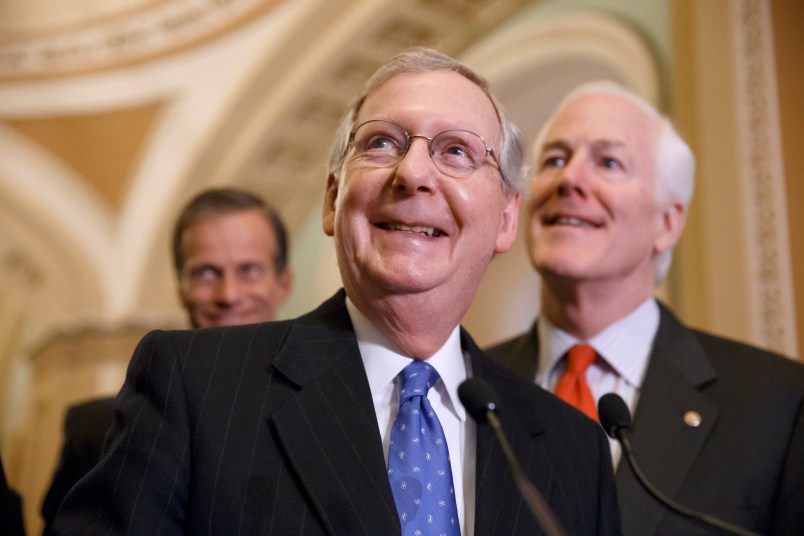Republicans take the reins of Congress this week facing a new conventional wisdom that they now have to prove they can govern.
But they don’t.
It may seem counterintuitive, but political science research suggests that Republicans have a stronger incentive to ensure gridlock on economic issues ahead of the 2016 presidential election, rather than pass legislation that President Barack Obama is willing to sign into law.
The reason is simple: Americans credit the president when things are good, and blame the president when things are bad, according to studies. It hardly matters who controls Congress. In addition, economic growth and presidential approval ratings are key predictors of the incumbent party’s performance in elections. That suggests voters would punish Democrats in 2016 if the Republican Congress fails to govern and improve the economy.
“The president typically bears more of the blame [for bad outcomes] under divided government,” said John Sides, a political science professor at George Washington University. “If a lack of initiative hurts the economy, the president pays a price. … So a sluggish economy and an unpopular president is helpful to Republicans up and down the ballot in 2016.”
A Quinnipiac survey after the midterm election found that a plurality of American voters — a 44 to 42 percent margin — would blame Obama instead of the Republicans for gridlock they expect to occur over the next two years.
“That makes it somewhat challenging for President Obama and for the Democrats more generally to turn Republican behavior in Congress into a political issue that nets them votes,” Sides said. “There’s not much evidence of that on the table in 2014, despite all the talk about how they’re gonna pay a price for the shutdown, they’re gonna pay a price for this or that, least productive Congress in history — all that talk never materialized into much.”
A 1999 study by political scientist Helmut Norpoth found that voters hold the president’s party accountable for economic outcomes.
“The fact that control of government is split between the major parties, as it was in different configurations in the most recent presidential elections, is not a fact of much significance for American voters,” he concluded. “Regardless, under both Republican and Democratic Presidents, and with Congress in the hands of the opposite party each time, voters assign responsibility for the economy to the President, not Congress; at least, they vote as if they followed that logic.”
A 2001 paper by political scientists Richard Nadeau and Michael Lewis-Beck reached a similar conclusion: “The presidential office is viewed as the command post of the economy, irrespective of whether the president actually has sufficient control of Congress to implement his or her economic plan.”
One mitigating factor is the tough Senate map for Republicans in 2016 — six incumbents face reelection in states that Obama won twice. That creates an incentive for them to side with Democrats on some issues. But that won’t necessarily amount to successful governing — for instance, blue state Republicans could vote with Democrats to pass certain bills, achieving some political cover in their states, but the Republican-led House could nix those bills.
“There may be an incentive for Republicans to do at least some things that senators like Mark Kirk [of Illinois] can take back to their constituents,” Sides said.
Bob Shrum, a veteran Democratic strategist, acknowledged that Republicans have a perverse incentive to maintain gridlock, but argued that it could backfire if they’re perceived as refusing to do anything for ordinary Americans.
“There is an incentive to ruin the economy as long,” he said, “as you don’t get caught doing it.”







Incentive my ass! They have a responsibility to govern, not campaign 24/7/365.25. This is their last chance to show the proof of conservative wisdom* in the form of actual results. Reality based people expect legislation that will only benefit the One Percent and Congressional fund raising.
*Yeah, conservative and wisdom are hard words to put in the same sentence.
Strategy aside - the GOP is incapable of doing anything productive whether one of their many factions wants to or not.
Another stupid Sahil Kaur story
Wow, Sahil. What a treatise of truthiness.
The reason is simple: Americans credit the president when things are good, and blame the president when things are bad, according to studies.
What neither the GOP nor the author seem to realize is that Obama is not up for re-election in 2016.
And the GOP doesn’t care - They are ideologically driven to get 100% of everything they want, or throw a tantrum trying. Saying they have some sort of strategy to do nothing to punish the President gives them too much credit.